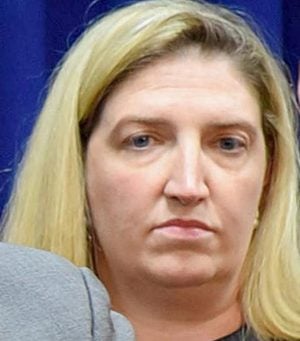Disbarred Former Prosecutor Gets Jail Time For Forging Judges' Signatures On Phony Wiretap Orders
Talk about bad judgment. The blatant abuse of power cost her hard.

Tara Lenich
It’s not uncommon to fall in love with someone you work with — you see each other every day; you deal with serious matters; you’re on the road together.
But when a prosecutor has an affair with a cop, ethical dilemmas are sure to follow if their first order of business is covering each other’s backs rather than following the rules.

Ranking The Law Firms Lawyers Love
Prosecutors rely on cops to make their cases. If a relationship with a cop is good, a prosecutor knows she can get him to show up in court when she needs him, remember his materials, and take the case seriously. The cop might go the extra mile to really look for the witnesses she needs, or even come in on a weekend for trial prep.
The problem is when business crosses over to love (or at least a love affair), the prosecutor’s obligation to be fair and objective may shift to doing whatever it takes not to harm the loved one.
The issue arose last summer in Kentucky when two prosecutors had affairs with investigators they worked with. In both cases, defense lawyers moved for the cases against their clients — both charged with murder — to be dismissed after learning of the amorous entanglements.
Lawyers for accused killer Jarred Tabor Long in Christian County, Kentucky, made the case that defendants have a right to be tried by a “disinterested prosecutor whose vision is not clouded.” They added that “an intimate relationship between a prosecuting attorney and a lead investigative detective would be considered anything but disinterested.”
Sponsored

Luxury, Lies, And A $10 Million Embezzlement

Ranking The Law Firms Lawyers Love

Curbing Client And Talent Loss With Productivity Tech

Law Firm Business Development Is More Than Relationship Building
In another Kentucky case, a judge ordered a new trial for a convicted murderer after the affair between the lead prosecutor and the chief detective was made public. It was alleged that because of their romantic liaison, the prosecutor covered up for the cop by failing to reveal he had lied to her. He’d never told her about the existence of video surveillance that suggested the crime was not committed by the defendant but someone else.
Prosecutors have tremendous power and autonomy in developing investigations and prepping cases for trial. When their judgment is clouded by feelings of loyalty to someone on their team, that power can be abused. Take, for example, the case of Tara Lenich.
Lenich was the deputy chief of special investigations at the Brooklyn District Attorney’s office when she had an affair with NYPD detective Jarrett Lemieux. When the couple broke up and Lemieux started a relationship with a different prosecutor, Lenich got jealous. She crossed the line in a big way by forging judges’ signatures on wiretap orders so that she could listen in on conversations between her former lover and his new partner.
Talk about bad judgment. The blatant abuse of power cost her hard. She was disbarred and prosecuted federally. She pleaded guilty.
Last week just before sentencing her, Federal Judge William Kuntz II of the Eastern District of New York appeared to understand the temptation that drove her. “Every person in this courtroom has at some point kind of wanted to know what a love interest or a love rival might be up to,” he said.
Sponsored

Law Firm Business Development Is More Than Relationship Building

AI Presents Both Opportunities And Risks For Lawyers. Are You Prepared?
But his punishment showed little mercy. Although he gave her a year less than the government recommended, Lenich got hit with 12 months in jail — a long haul for someone not used to spending time locked up with the people she helps put in jail.
Even though Lenich’s abuse of power was not aimed at defendants and represented an immature craving to learn about an ex-lover, as Judge Kuntz put it, “You can’t use your power in hand to peek.”
I see a book in her future. “Green is the New Black.”
Toni Messina has tried over 100 cases and has been practicing criminal law and immigration since 1990. You can follow her on Twitter: @tonitamess.







